

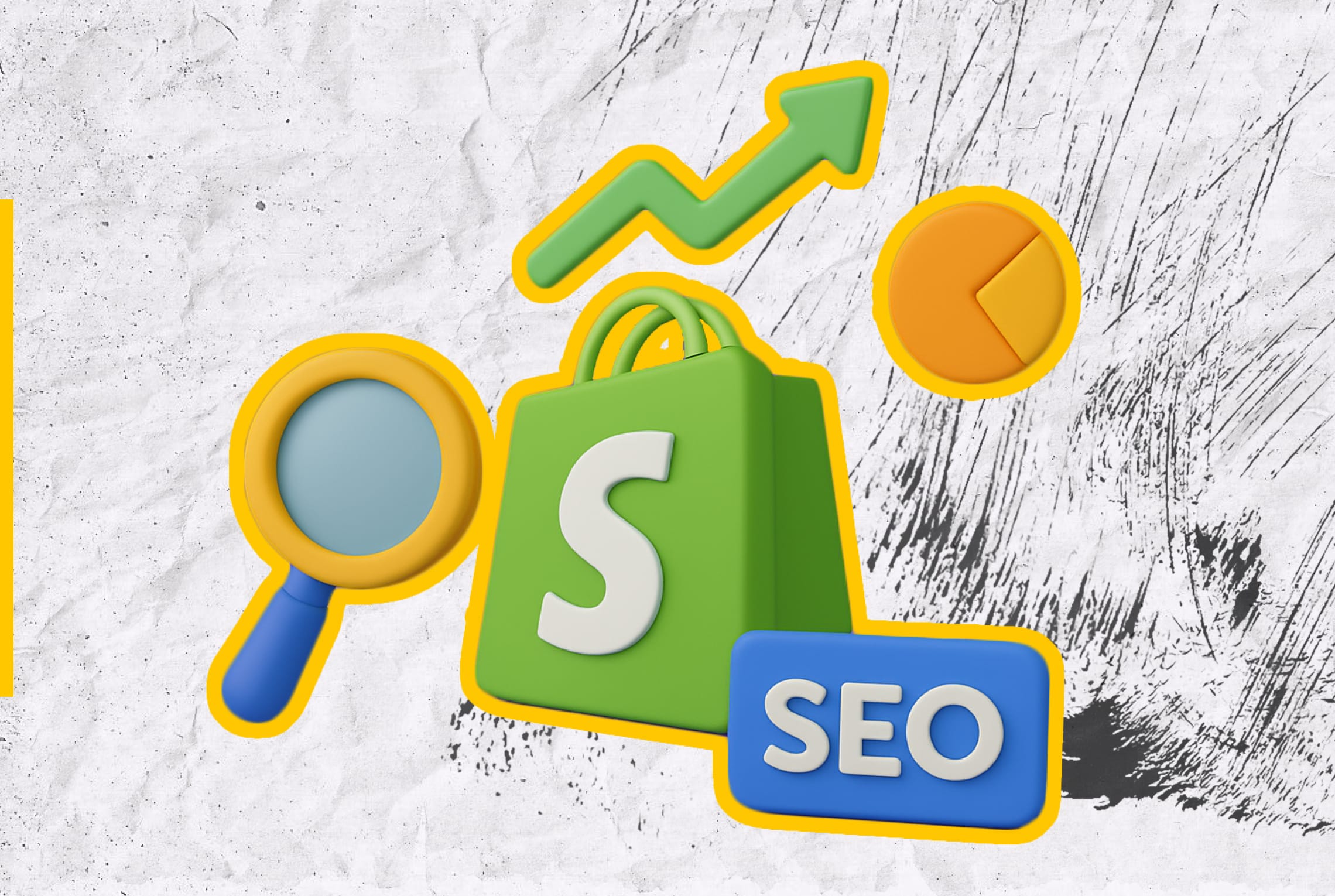
Shopify–the world’s Fifth Avenue. Fantastic stores, high traffic, aggressive competition. If you’re planning to set up shop there, you’ll have to make your business noticeable.
Sellers often think that Shopify = automatic success. They are only half right. True, opening a store with Shopify is both easy and fast. But getting customers? Not so much.
Everything you’ve heard about e-commerce being a “competitive landscape” is right. At the moment, the online retail giant powers nearly 5 million stores across 175 countries.
Don’t worry—you won’t have to compete against all of them. But you’ll still have to work on your store’s visibility, crawlability, and conversion potential. I’ll help you with that.
Today, I will tell you everything about apps and tools that can help you fill in the gaps and boost search traffic to your store. Below, I will cover the best Shopify SEO tools in 2025, both free and paid, and help you pick the right one for your specific situation and use case. Let’s go.
Need smarter keyword insights and competitive data for your Shopify store? Try Rankioz free – built for e-commerce growth.
What is the first thing you should look for in a Shopify SEO tool?
The main factor to consider here is whether or not a tool actually works for Shopify SEO, because not all of them do. Well-known all-in-one tools like Ahrefs might be useful for keyword research and backlinks, but not for on-page SEO. Shopify requires a special approach for this.
Due to this unique structure, the first thing you should look for is:
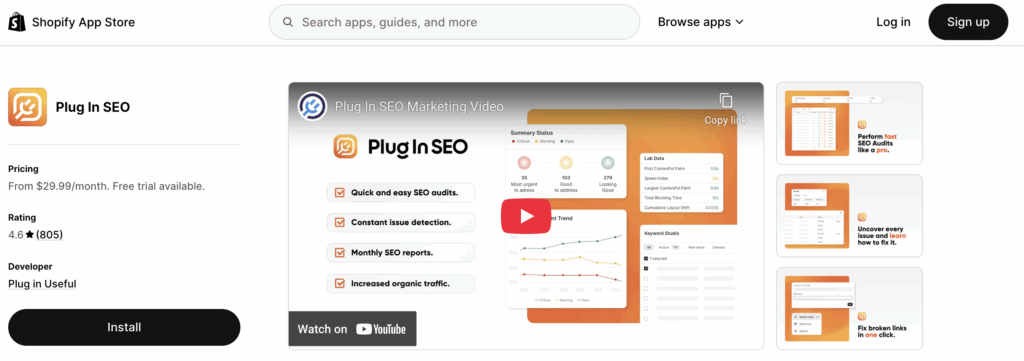
Plug In SEO claims to be a super-friendly diagnostics and reporting tool for Shopify store owners who prefer a budget-friendly, DIY approach to optimization. It performs as promised: It scans your store for common SEO issues and tells you how to fix them. Clean and easy.
Standout Features
Pricing
Who It’s Best for
Small and mid-size Shopify sellers looking for a hassle-free, easy to master solution that doesn’t involve complex teamwork or expensive consultants.
Pros
Cons
Shopify App Store Rating
4.6/5 stars based on 811 reviews
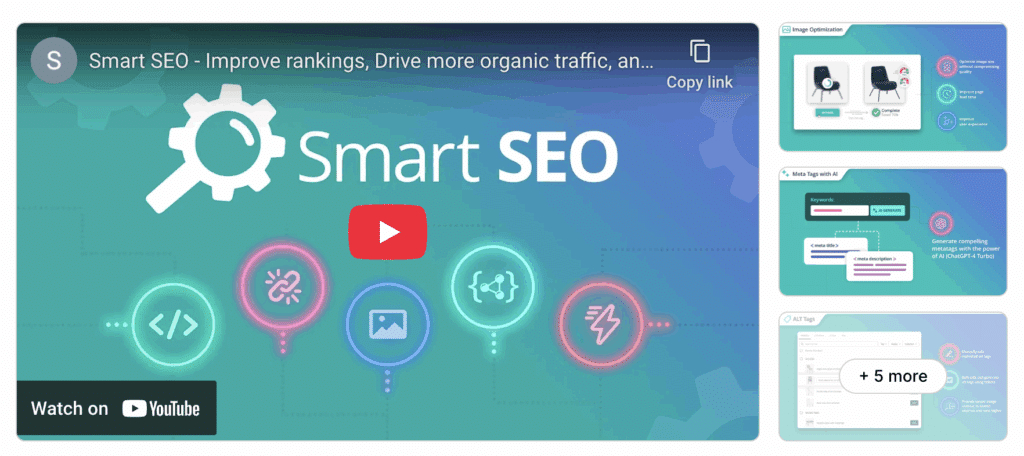
Smart SEO was built by Sherpas Design to automate SEO tasks that are daunting to beginners and taxing to advanced users, like generating meta tags, image alt tags, and structured data. But that’s not the best part. The best part is that it uses templates and automation rules for EVERYTHING, allowing you to keep your SEO on point and still have a social life. Hard to believe, I know.
Standout Features
Pricing
Who It’s Best for
Sellers with large product catalogs and multilingual stores who need automation and scalability.
Pros
Cons
Shopify App Store Rating
5.0/5 stars based on 878 reviews
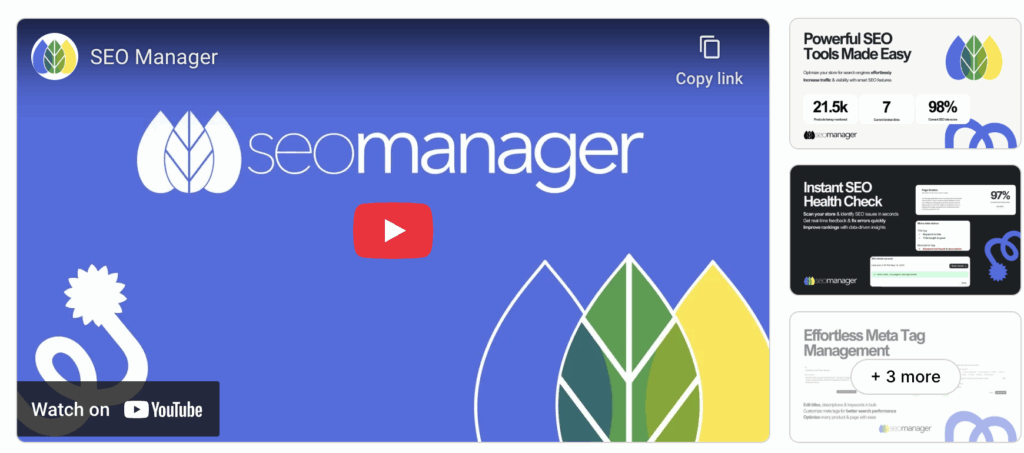
Venntov has literally written the book on Shopify SEO, as it says on their site, but I guess it’s never been published. Instead, they’ve designed SEO Manager, an elegant Shopify SEO tool that helps with technical optimization. It performs page analysis in real-time and highlights issues and opportunities with practical solutions that you can implement without switching tabs.
Standout Features
Pricing
Who It’s Best for
Store owners who want more control over SEO settings and prefer real-time guidance without needing external SEO software.
Pros
Cons
Shopify App Store Rating
4.7/5 stars based on 633 reviews
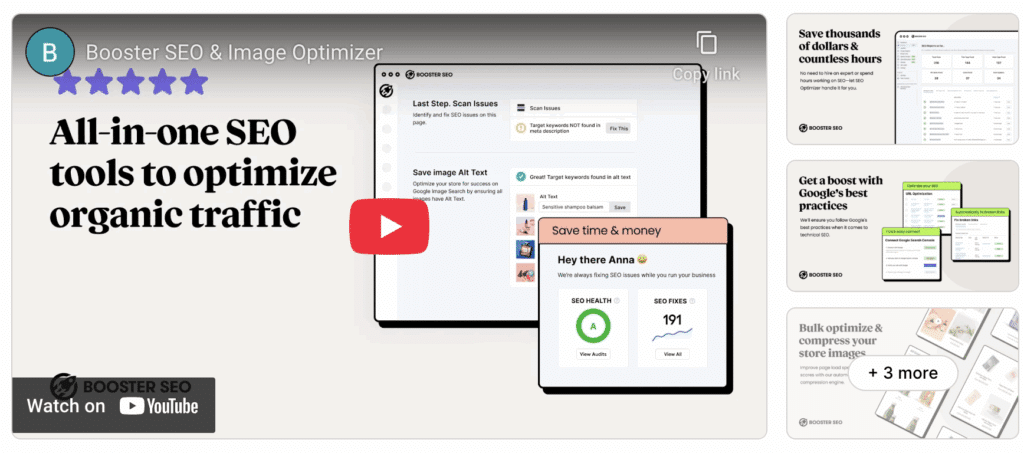
Booster SEO & Image Optimizer is a top-rated solution for Shopify stores that boosts SEO by automating image compression—a precious combo for owners struggling with speed. In fact, this tool means serious business when it comes to automation and does a lot of heavy lifting for you. It generates alt texts, lets you rename files in bulk, and updates your sitemap and robots.txt file.
Standout Features
Pricing
Who It’s Best for
Shopify stores with large image inventories or site speed issues.
Pros
Cons
Shopify App Store Rating
4.9/5 stars based on 4,389 reviews
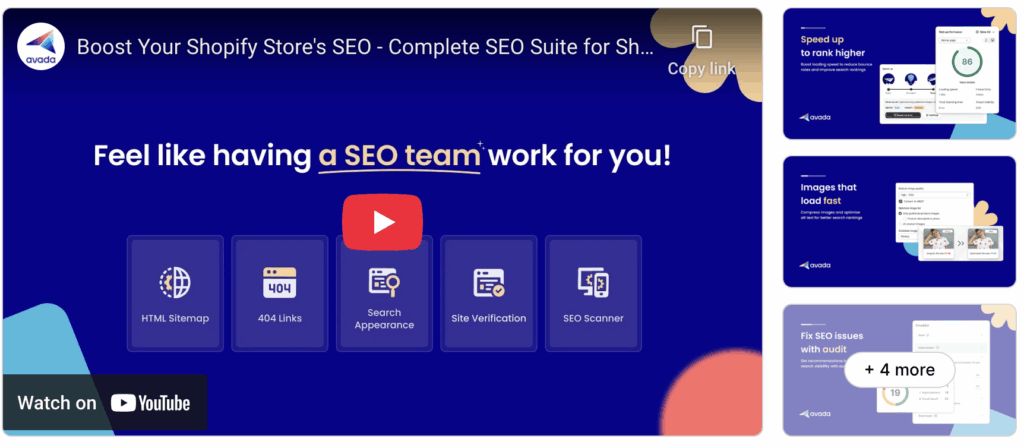
Avada SEO Suite is a comprehensive Shopify tool that leaves nothing to chance. It provides end-to-end solutions for on-page SEO, allowing you to scan your store while working and cross potential issues off the live checklist. If there are any missing meta tags, slow-loading images, or broken links that can hurt your rankings, it will let you know before they get picked up by crawlers.
This truly extensive suite includes a keyword suggestion tool that shows relevant terms directly in your product and collection pages while you’re editing. Just when I thought there could not be more, Avada surprised me with rich snippet markup, multilingual SEO, and automatic redirects for broken URLs. If you have a large store and you plan to keep growing, this tool is a solid pick.
Standout Features
Pricing
Who It’s Best for
Large store owners in need of scalable solutions that combine automation with manual control.
Pros
Cons
Shopify App Store Rating
4.9/5 stars based on 3,898 reviews
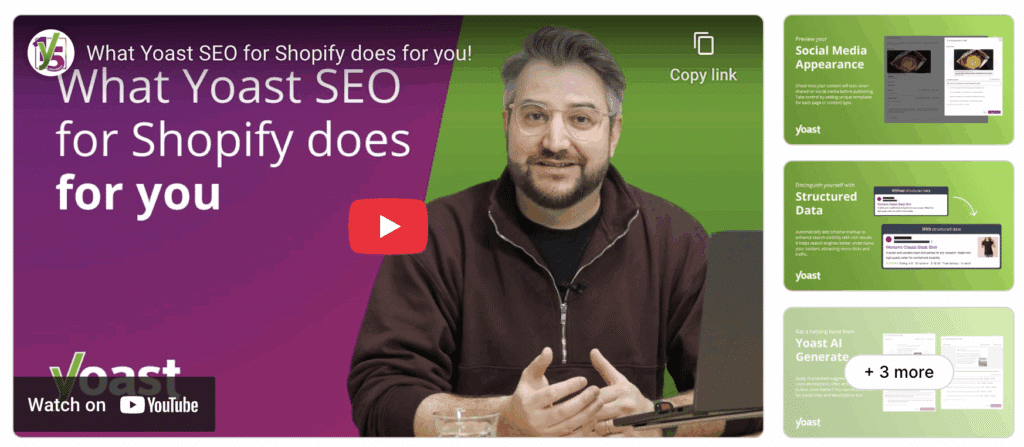
Do you depend on creative writing to drive clicks and conversions? Then Yoast is for you. Made primarily for WordPress sites, this beginner-friendly tool is well-known for its clean interface and content-focused SEO guidance. Yoast may not be the most technical SEO tool, but it’s a loyal ally for content optimization, both in terms of readability and keyword targeting and placement.
Yoast SEO for Shopify also equips online retailers with features like built-in structured data, automatic canonical tags, and SEO previews for Google and social media. It can’t optimize your images, but it will help you craft a copy that’s easy to find and irresistible to click on.
Standout Features
Pricing
Who It’s Best for
Sellers who rely on content quality and need help writing clickable copies.
Pros
Cons
Shopify App Store Rating
4.4/5 stars based on 129 reviews
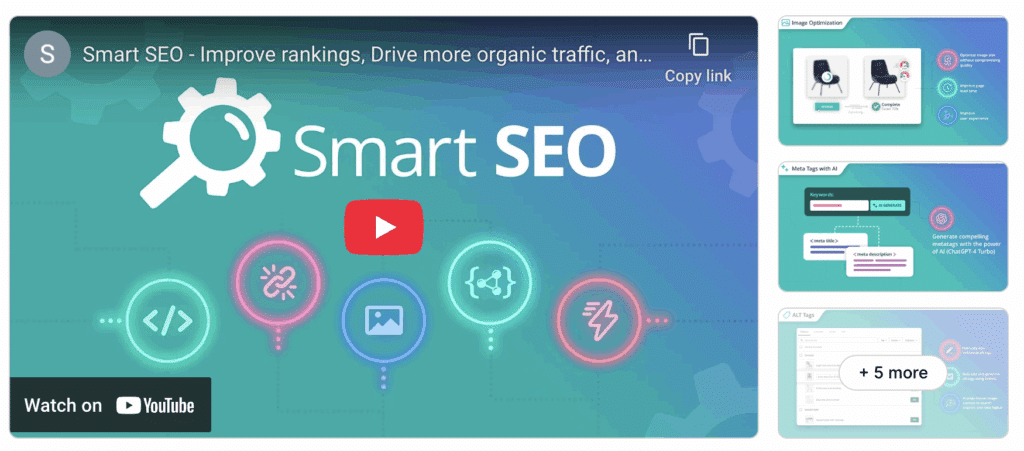
Trust Sherpas to build you a technical SEO tool for any given environment, and you’ll get Smart SEO for Shopify. Its star feature is a dynamic templates system that lets you generate metadata in bulk based on custom rules like product type, tags, or vendor. And if you get busy or just lazy, you can automate other elements like meta tags, alt texts, schema, and multilingual metadata.
My general impression? Sherpas Smart SEO is a great tool for store owners who know better than to underestimate their SEO needs or manually micromanage every page.
Standout Features
Pricing
Who It’s Best for
Store owners with large catalogs or global customers who need bulk automation and multilingual SEO.
Pros
Cons
Shopify App Store Rating
5/5 stars based on 879 reviews
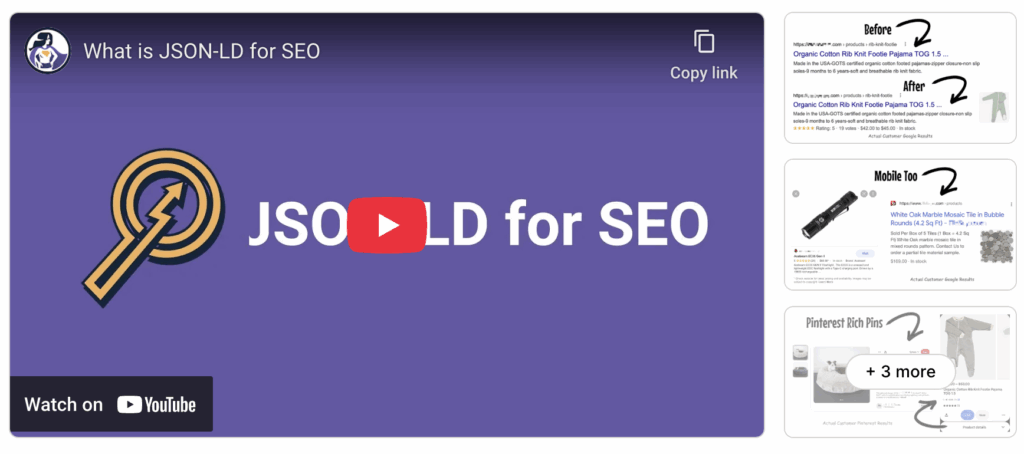
It might shock you to hear that JSON-LD for SEO is a specialized SEO tool for… JSON-LD. Its sole purpose is to help you add high-quality structured data to your Shopify store–and it does that exceptionally well. Instead of trying to compete with other tools on this list, it minds its own business and makes sure your store qualifies for rich results on Google, pushing it higher on SERPs.
JSON-LD might be narrow in scope, but it’s incredibly sophisticated and requires zero manual effort. It runs quietly in the background and updates automatically with Google.
Standout Features
Pricing
Who It’s Best for
Sellers who want to improve SERP visibility with rich snippets without complex code.
Pros
Cons
Shopify App Store Rating
4.9/5 stars based on 420 reviews
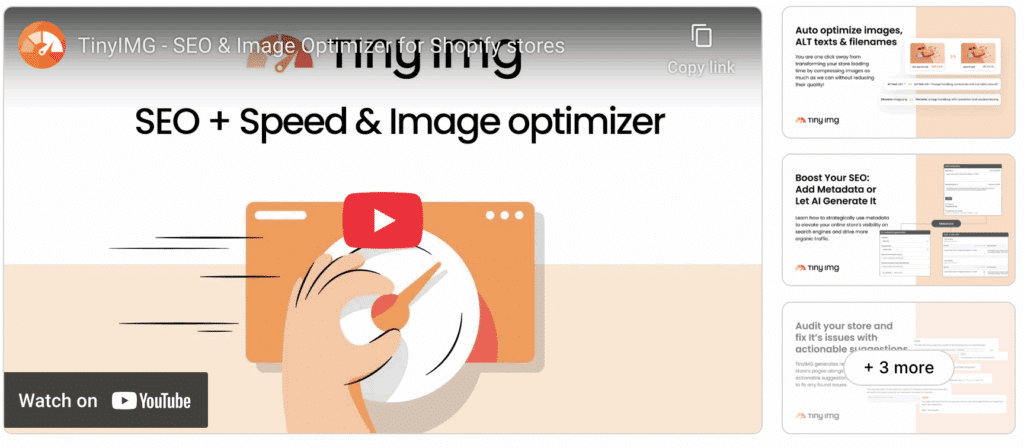
TinyIMG helps you tackle two key elements of Shopify SEO: image optimization and technical health. It offers top-notch image compression that doesn’t sacrifice quality for automation, which is fantastic news for store owners with large inventories that depend on visual content. In terms of technical SEO, TinyIMG detects common issues like meta tags, broken links, and slow load times.
Besides the standard but reliable SEO kit, I also liked the tool’s file renaming feature, which automatically assigns SEO-friendly, keyword-rich names to boost image visibility. Plus, there are other useful features like automatic JSON-LD, metadata templates, and multilingual SEO support.
Standout Features
Pricing
Who It’s Best for
Non-technical sellers who rely heavily on visual content and want faster load times.
Pros
Cons
Shopify App Store Rating
5.0/5 stars based on 1,704 reviews
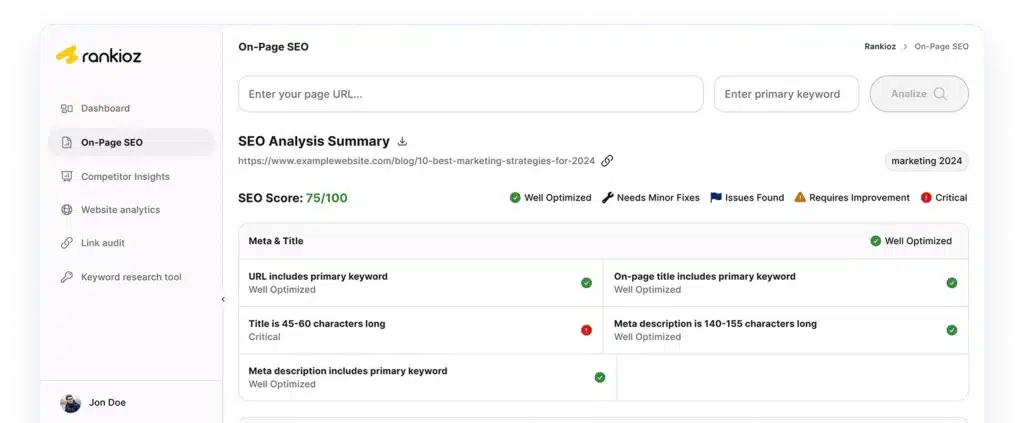
Rankioz is the best Shopify SEO tool outside of the Shopify App Store. Can it replace specialized tools like JSON-LD for SEO or TinyIMG? No, not exactly. But it will super-charge your rankability with high-quality keywords and competitor analysis. It can dig up long-tail keyword opportunities that are tailored to your niche and help you outrank stores competing in the same place as you.
As part of a full-feature SEO toolkit, you’ll get SERP tracking, backlink analysis, competitor keyword gap reports, and other capabilities needed for building a content-first SEO strategy for Shopify. Rankioz can be stacked with other Shopify tools for a complete SEO view of your store.
Use Rankioz to find profitable long-tail keywords and track your competitors’ rankings—essential for Shopify growth. Start your free trial today.
Standout Features
Pricing
Who It’s Best for
Online sellers who want to extend their retail empire and track SEO performance beyond Shopify.
Pros
Cons
| Tool | Free Plan | Meta Editing | Image SEO | Price | Best For |
|---|---|---|---|---|---|
| Plug In SEO | X | Bulk editing | X | $29-/99-$99.99/month | Sellers seeking DIY guidance and easy fixes |
| Smart SEO | ✓ | Template-based bulk editing | Alt text automation | $9.99-$29.99/month | Stores with large catalogs and multilingual needs |
| SEO Manager | X | On-page editor with tips | X | $9-$59/month | Owners wanting real-time SEO suggestions and control |
| Booster SEO | ✓ | Meta templates | Compression and alt text auto | #39-#69/month | Speed-focused stores with large image inventories |
| Avada SEO Suite | ✓ | Live checklist + template | Alt text optimization | $34.95-$99/month | Large stores in need of scalable, all-in-one optimization |
| Yoast SEO | X | Live SEO and readibility editor | X | $19/month | Content-driven sellers focused on keyword-rich copy |
| Sherpas Smart SEO | ✓ | Smart templates | Alt text templates | $9.99-$29.99/month | Global stores with bulk needs and hreflang/multilingual SEO |
| JSON-LD for SEO | X | X | X | $399/year | Stores wanting reach snippets via best-in class structured date |
| TinyIMG | ✓ | Templates and auto checks | Compression and renaming | $14-$23/month | Visual-heavy stores in need of speed and technical SEO coverage |
| Rankioz | X | X | X | $30/month | Keyword/competitor research to complement Shopify-focused SEO apps |
Yes, you can do SEO directly on Shopify, but only to a certain extent.
The platform comes with a handful of SEO features, like clean URL structures, automatic sitemaps, and editable meta fields, but I’m afraid these tools are not enough for maintaining your store’s SEO health, especially if you’re planning to grow or if you need added exposure.
Then, Shopify stores have a few limitations that may hurt your SEO:
The theme plays a crucial role in how you perform in SERPs. Pick a poorly coded theme or try to edit a good one without any technical skill, and it will slow down your page speed, mess with your structured data, or create duplicate content that will confuse search engines.
Shopify’s URL structure spells a crawling disaster, too. Not being able to change URLs for product and collection pages means less focus on targeted keywords in URLs.
Last but not least is page speed. Truth be told, Shopify has worked hard to improve its core performance, but the platform’s reliance on images and themes can easily undo all that. Page load time is directly responsible for bounce rate and rankings, so it’s kind of a big deal.
In short, that’s why you need third-party tools. Solutions that can compress images and monitor speed bottlenecks are absolutely vital for Shopify success. The same goes for structured data support and meta tag tools, which help solve bloated themes and keep URLs clean.
Want to do it faster than the competition?
Use Rankioz to power your SEO strategy. Try it for free.
Should you consider paying for a Shopify SEO tool? And when?
If you’re a new shop owner, you don’t have to think about that.
Free tools and plans with basic SEO features are a great starting point—as long as they can help you detect and clean up major issues that can crash your rankings. If it enables you to edit meta titles and descriptions, generate alt texts, and run audits, it’s good enough.
You’ll also notice that free tools come with usage caps, limited automation, and generic tips, which will start to feel restrictive when your store begins to grow. At this point, you should either upgrade or start looking for a capable paid alternative that can scale with you.
The greatest advantages of paid tools for Shopify SEO are better support, deeper data, and hands-free automation. Paid apps also come with faster response times, detailed insights, and more customizable workflows, but that can cost up to $70 per month. It’s not cheap.
If you need a more affordable solution, Rankioz is a smart choice. It gives you in-depth keyword research, SERP tracking, and competitor analysis for only $30 per month. You can stack it with a free tool and get a full Shopify SEO suite for a fraction of what you’d have to pay.
One thing that both free and paid Shopify SEO apps lack is flexibility. If you look in the App Store, you will find either specialized tools like JSON-LD and TinyIMG or general-purpose Shopify apps like Plug In SEO and Smart SEO. Notice a gap? Neither is built for your needs.
The best Shopify SEO tool for you is the one that fits your store size, business model, and ultimate goals. With that in mind, I’ve stacked a few in-store apps from this list and external tools like Rankioz to help you grow your store in four common e-commerce scenarios:
You’re just launching your first Shopify store? In that case, your priority is to get indexed and to build organic traffic. Use a free SEO tool like Plug In SEO or Smart SEO for basic optimization without technical skills, and combine it with Rankioz to target the right keywords.
I have just one word for you: automation.
When you’re managing an expanding catalog, you need premium apps like Sherpas Smart SEO or Avada to automate metadata and alt text generation, but you also need a tool like Rankioz to monitor rankings, spy on competition, and create content that drives conversions.
Dropshipping has notoriously tight margins and high competition: You need to get and stay ahead no matter what. I’d use an app like Booster SEO for speed and image optimization, and a tool like Rankioz to keep my copy fresh, relevant, and in vogue with the latest trends.
You’re running a brick-and-mortar store with Shopify POS? You still need SEO. Use a tool like Yoast to optimize for local SEO and get discovered in local searches. Rankioz can help you find geo-targeted keywords and monitor how your store performs in local SERPs.
The best Shopify SEO app is the one that fits your needs. Smart SEO and Avada are the best tools for automation, while Yoast SEO delivers the best content optimization results. For structured data, use JSON-LD for SEO. If you need keyword and competitor research, go with Rankioz.
Shopify offers a handful of features for SEO support, but it lacks advanced capabilities that actually make a difference in competitive e-commerce niches.
Sure, there is a special version of Yoast built specifically for content-focused sellers on Shopify. It includes features for real-time content analysis, social previews, and structured data.
Shopify SEO tools like TinyIMG or Booster SEO are made to help store owners compress image files, automate alt text, and add keywords to image filenames. Optimizing Shopify images for SEO helps improve page speed and visibility in Google Image Search.
Shopify may feel crowded and competitive, but the right SEO tool–or combination of them—can help you get noticed. Look at the Shopify App Store for image optimization, structured data support, and technical SEO. The only feature you won’t find is keyword research.
The apps I’ve covered here can do virtually everything you need to make your Shopify store discoverable, but they can’t help you discover competitive keywords. Rankioz can.
With Rankioz, you’ll notice a true difference—and not only because it actually enables you to monitor your SEO progress. It also helps you uncover keywords that your competitors rank for and find content gaps that no one else is targeting. And it’s only half your SEO budget.
Want to compete smarter on Shopify’s most valuable real estate? Try Rankioz free and start building your store’s next traffic breakthrough.

You can’t get anywhere in 2026 as an entrepreneur without a well-optimized website. It doesn’t matter if you have a...


Getting site optimization right isn’t as simple as adding a few keywords and uploading a blog post every now and...


Setting up an SEO strategy takes time, and there are lots of details to go over, but sometimes you just...


If you want to advertise your services or sell products in this day and age, you need to drive more...


When you look at some of the biggest names in business, like Ahrefs and Semrush, the monthly subscription for even...


The right keyword generator can point you toward the topics that matter, whether you’re a beginner or already know your...
